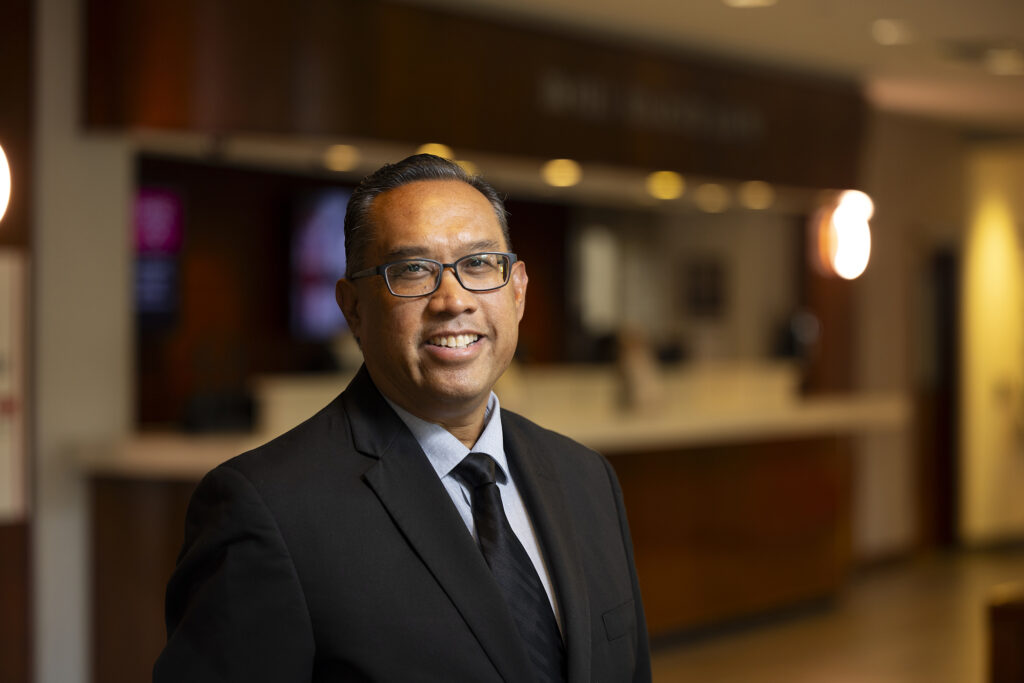For John Salazar, his role as professor and director of the Hospitality and Food Industry Management (HFIM) program at the University of Georgia is “very much a full-circle moment.”
Salazar, who was born and raised in Chicago, Illinois, has been fascinated by the hustle and bustle of the hospitality industry for as long as he can remember.
“When I was in high school in Chicago, I enjoyed visiting the hotels downtown, where I got a feel for the industry. Hotel lobbies are some of the liveliest places in a city and I was drawn to the activity I saw there, the beautiful work settings, the guest interactions, the history in these buildings. I just found it all really attractive,” Salazar said.
Following this passion, Salazar majored in hospitality in college, took internships with Marriott Hotels and Resorts, and worked at Boston Logan International Airport to better understand the full scope of the hospitality industry. At the end of his first year of college at Southern Illinois University in Carbondale, Salazar knew it was time for a change, and he considered transferring to a program at Michigan State University or Northeastern University, along with a few other options farther south.
One of these options was UGA.
“I knew they had a reputable program in their family and consumer sciences college, and I’d always had a desire to explore the Southern United States more fully, so I picked up the phone and gave UGA a call to learn more,” said Salazar. “During that phone call, however, I was informed that UGA was going to be ending their program, which I thought was incredibly unfortunate.”
After hearing that news, Salazar decided to attend Northeastern University in Boston, where he received a Bachelor of Science degree in commercial recreation management with a specialization in hotel management. More than 30 years later, an email from a colleague put Athens back on Salazar’s life map. In 2019, Salazar was hired to start a new hospitality program at UGA, this time housed in UGA’s College of Agricultural and Environmental Sciences (CAES).
“Lo and behold here I am, finally, at UGA,” Salazar said.
Since its rebirth, the HFIM program has experienced exponential growth under Salazar’s leadership. HFIM is the second-fastest-growing major at UGA since 2019, with 335% growth since its establishment. This year, Niche.com ranked UGA the No. 1 public school in America for colleges with hospitality and tourism management programs.
HFIM interns have been placed with 81 companies in 13 states and the District of Columbia, totaling 144 internship placements. Students are exposed to the broad scope of hospitality through placements ranging from Chateau Elan Winery and Resort in Braselton to Walt Disney World in Orlando, Florida.
“I think the fast growth of our program demonstrates that hospitality and tourism are vital components of the state economy and that there have been individuals interested in this discipline for quite some time. With that, our program is not based on the theoretical or the case study, it’s based on real-life experience and the practice of hospitality leadership,” Salazar said.

John Salazar, left, talks with one of his students, Matthew Harrington, as he works his shift at the front desk of the Georgia Center Hotel and Conference Center. (Photo by Andrew Davis Tucker/UGA)
Hospitality and tourism encompass a wide variety of segments, including traditional hotels and restaurants, but also airports, sports entertainment, cruise lines, theme parks and event planning. In Georgia alone, there are nearly 400,000 individuals employed in some segment of hospitality, and with the unique mix of leisure travel in coastal Georgia and convention travel in Atlanta, HFIM students have a wealth of opportunities to figure out what area of hospitality suits them best.
“Experiential learning is a critical part of what we do here, and it does one of two things: It either affirms a student’s desire to work within a specific segment, or it allows them to see that maybe they should try a different angle of the industry. We’ve had students in their first internship realize that they really like food, but maybe the hotel part isn’t for them. Great! Sink your teeth into restaurant management,” Salazar said. “We’re trying to give students a greater level of confidence in the field so that when they graduate, they have a sense of where they want to go and who they want to be.”
Though the program is ahead of schedule in terms of growth, Salazar is looking to the future. With hospitality driving a large part of Georgia’s economy—it is the second-largest industry in the state after agriculture—he sees a huge opportunity for HFIM professionals to work with UGA Cooperative Extension to provide hospitality and tourism management best practices to communities throughout Georgia. Salazar hopes to increase engagement with local governments and communities while improving student enrollment, business engagement and innovation in classroom curricula.
“We’re really grateful to be housed in CAES as we look toward future goals because of the way it positions us to create a more holistic education for our students. Agriculture and hospitality are inextricably linked—hospitality interacts with agricultural economics, food science and production, horticulture, viticulture and so much more. Our students build bridges with other disciplines they might not with another college, and, because of that, they have a wonderful, well-rounded experience,” Salazar said.
This versatile experience—with its focus on quality curriculum, meaningful interaction with local and national business, and transformative experiential learning—has already begun graduating the next generation of leaders in the hospitality industry.
“The vote of confidence I get in what we’re doing is in the jobs our students are getting after graduation. When our students are being hired right out of the gate for management positions, that’s how I know what we’re doing is working,” Salazar said.
It’s clear that Salazar is on the right track. HFIM is on a steady upward trajectory toward becoming the premier hospitality program in the United States.
To learn more about UGA’s Hospitality and Food Industry Management program, visit the website. To hear directly from Salazar on Georgia’s hospitality ecosystem, listen to the latest from Cultivating Curiosity, a podcast produced by CAES.
